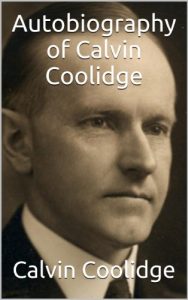 I read this book after reading Amity Shlaes’s “Coolidge,” in part because Shlaes more than once refers to the “Autobiography.” While it is not an analytical work, rather a straightforward exposition by Coolidge of the facts of his life, it is an excellent complement to Shlaes’s longer (and also excellent) work. And as with that work, the “Autobiography” shows an America that is dead and gone, but one that contained within itself multitudes of virtues.
I read this book after reading Amity Shlaes’s “Coolidge,” in part because Shlaes more than once refers to the “Autobiography.” While it is not an analytical work, rather a straightforward exposition by Coolidge of the facts of his life, it is an excellent complement to Shlaes’s longer (and also excellent) work. And as with that work, the “Autobiography” shows an America that is dead and gone, but one that contained within itself multitudes of virtues.
Coolidge had a well-deserved reputation for being a careful wordsmith, creating plain speech with great impact. This book exemplifies that wordsmithing. But if you’re looking for Coolidge’s inner thoughts about the meaning of being Calvin Coolidge, you’re likely to be sorely disappointed. If you want a psychological self-analysis where he reflects on all his mental hobgoblins and who’s to blame for them, you will be even more disappointed. However, if you want Coolidge’s view on what and who was important in his life, along with a concrete philosophy consisting of a few well-chosen words and phrases, showing what drove him in life, you will be very satisfied.
Coolidge’s core value is industriousness, which as Charles Murray points out and discusses in “Coming Apart,” from the founding of the American colonies to 1960 or so was universally regarded in America as a, and probably the, core virtue required of any American. Of course, this seems somewhat strange nowadays, when industriousness has greatly declined and is regarded as first cousin to greed, and also as far subordinate as a virtue to the modern “virtues,” such as total sexual autonomy, loving oneself while living off the labor of others, and bemoaning supposed racial and sexual injustices. But for Coolidge, industriousness was the mark of, and requirement for, any respectable citizen.
So therefore Coolidge requires each person to do what he can with what he is given. “When we come into the world the gate of gifts is closed behind us. We can do nothing about it. So far as each individual is concerned all he can do is to take the abilities he has and make the most of them. His power over the past is gone . His power over the future depends on what he does with himself in the present. If he wishes to live and progress he must work.” Similarly, later, “Surprisingly few men are lacking in capacity, but they fail because they are lacking in application. Either they never learn how to work, or, having learned, they are too indolent to apply themselves with the seriousness and the attention that is necessary to solve important problems.” Such sentiments appear throughout the book, and Coolidge’s life itself exemplifies what can be done by a person who is industrious.
Coolidge also notes the importance of historical knowledge for education, by which he means real historical knowledge, starting with the Classical Age, not gender studies or what passes for “knowledge” in the modern America. As he says of his own historical studies, “They gave me a vision of the world when it was young and showed me how it grew. It seems to me that it is almost impossible for those who have not traveled that road to reach a very clear conception of what the world now means.” We see this today, when history teaching is essentially nonexistent—most people, including nearly 100% of our political leaders, are therefore unable to see, looking around them, what the world now means.
Coolidge also seems to have foreseen the Age of Obama. “I have tried to refrain [as President], from abusing other people. The words of the President have an enormous weight and ought not to be used indiscriminately. It would be exceedingly easy to set the country all by the ears and foment hatreds and jealousies, which, by destroying faith and confidence, would help nobody and harm everybody. The end would be the destruction of all progress.” A better summation of the Obama presidency and its effects would be hard to craft.
In one area, Coolidge does let slip his own thoughts. Poignantly, Coolidge says of the death of his son Calvin (at 16, while Coolidge was President), “In his suffering he was asking me to make him well. I could not. When he went the power and the glory of the Presidency went with him.” Given that Coolidge’s only sister died when he was in high school and his mother died when he was twelve, Coolidge doubtless had much internal sorrow. But he does not dwell on such things, and he is certainly not going to discuss it with the reader. It was not his way.
You can see why Coolidge is largely forgotten today. In many ways, that such an American was once President is a reproach to modern America, which in both its government and its people has neglected every single virtue that Coolidge regarded as essential. But perhaps everything old is new again, and someday a new Coolidge for a new time will bring similar wisdom to our country.
